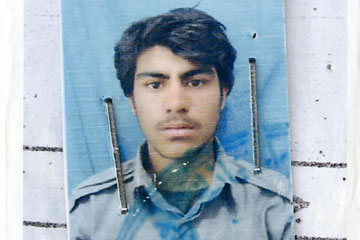
This photocopy of an image of Abdul Razaq, the killer of the three Marines, was given to the writer by a Marine in Helmand.
(3 of 12)
When the Marines rejected my request to embed with Team 8133--the team Abdul Razaq attacked on Aug. 10--a public-affairs officer, Lieut. Colonel Tom Bryant, explained by e-mail: "Our unwillingness to entertain your request has nothing to do with the potential for negative coverage. Rather, it has everything to do with the fact that the team is continuing to conduct combat operations."
The Marines had previously allowed a reporter from the San Diego Union-Tribune to embed with Team 8133. In the wake of the Aug. 10 attack, it was not difficult to see why a unit might not want to take on a reporter. But there were also reports by the Associated Press that ISAF officials had tried to suppress details about green-on-blues. The International Crisis Group agreed with these reports. "The attempt to spin these attacks as isolated occurrences," its December 2012 analysis went on, "appears to have blinded ISAF leadership to the risks they might pose to overall perceptions of the mission."
Marines down the chain understood the importance of perception. The captain of Team 8133 told the embedded Union-Tribune reporter that he knew his district was improving because local kids were pretending to be police instead of Taliban in their games. "It wasn't cool to be a sheriff," ran his quote, six days before Abdul Razaq shot him dead. "It was cool to be a bank robber until Wyatt Earp came along and started making a name for himself and for lawmen."
As a young man, Abdul Razaq crosses the border into Pakistan. It is easy to misinterpret his trip, just as it is easy to make too much of a man's last quoted words. But after the attack, news of Abdul Razaq's travel will draw grave and knowing head shakes from U.S. and Afghan officials alike. He is a country boy who goes to Quetta, a city of refugees. He visits Karachi, a city so big it is visible from space. There are possibilities. Pakistan, however, is not his home. He and his brother get jobs--selling fruit from wheelbarrows--but Abdul Razaq does not like the work. The owner of the wheelbarrow takes 50% of everything. It is not a good deal. Abdul Razaq tells his brother, Let's go back to Afghanistan. But his brother is satisfied enough selling fruit.
Abdul Razaq is not. He has the adolescent audacity to leave his brother and mother and cross back into Afghanistan. In his late teens or early 20s he arrives in Lashkar Gah, Helmand's capital. By this time, the mid-2000s, the Taliban are resurgent. The odd sniper fires across the river. But still, Abdul Razaq is free to walk clean-shaven along wide, American-style streets. Somewhere between tending fields and pushing the wheelbarrow, he has learned a little about engines, and he finds a job working for a mechanic. Lashkar Gah has a kind of car culture. The Toyota Corolla is ubiquitous, and fleets of trucks pass through. Three-wheeled tuk-tuks are also numerous. Painted brightly in yellow and orange, they are sometimes decorated with shards of mirror. These reflect a thousand-year-old city where, after Abdul Razaq gets off work, the streets are deserted at night.
